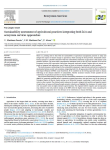Martínez-García V., Martínez-Paz J.M., Alcon F. (2025). Sustainability assessment of agricultural practices integrating both LCA and ecosystem services approaches. Ecosystem Services, 01/04/2025, vol. 72, p. 101698.
https://doi.org/10.1016/j.ecoser.2025.101698
https://doi.org/10.1016/j.ecoser.2025.101698
| Titre : | Sustainability assessment of agricultural practices integrating both LCA and ecosystem services approaches (2025) |
| Auteurs : | V. Martínez-García ; J.M. Martínez-Paz ; F. Alcon |
| Type de document : | Article |
| Dans : | Ecosystem Services (vol. 72, April 2025) |
| Article en page(s) : | p. 101698 |
| Langues : | Anglais |
| Langues du résumé : | Anglais |
| Catégories : |
Catégories principales 06 - AGRICULTURE. FORÊTS. PÊCHES ; 6.4 - Production Agricole. Système de ProductionThésaurus IAMM PRATIQUE AGRICOLE ; DURABILITE ; ANALYSE DU CYCLE DE VIE ; SERVICE ECOSYSTEMIQUE |
| Résumé : | There is a pressing need to deal with the sustainability of agricultural management practices to adapt and mitigate the impacts of climate change on agriculture, while ensuring the food provision. Sustainable intensification emerges as a feasible alternative while the sustainability assessment of agriculture is still unclear in the scientific literature. The most widely comprehensive assessment tools are the Life Cycle Analysis (LCA) and the Ecosystem Services (ES) approaches, being them frequently employed isolated. Despite there are several proposals to integrate both approaches, none of them are focus on economic valuation for policy analysis. This study proposes a methodology for the sustainability assessment of agricultural practices that considers the relationship between society and ecosystems, integrating both LCA, ES approaches within the Drivers-Pressures-State-Impact-Response (DPSIR) causal framework. ES is considered as the driving approach based on human well-being as the ultimate objective of sustainability. Thereby monetary valuation would quantify the net contribution of agricultural practices to human well-being. The proposed methodology is employed for the sustainability assessment of a set of Best Management Practices (BMPs) for sustainable intensification in intensively irrigated agriculture, with the lemon crop in the Campo de Cartagena (Region de Murcia, Spain) serving as an illustrative example, constituting a useful guide for application in other contexts. The obtained results underscore the need to integrate both positive and negative impacts of agriculture on human well-being through monetary valuation and highlight the dominance of market values over non-market values in highly intensive agroecosystems. The regulated deficit irrigation and incorporation crop residues to the soil practices emerge as the BMPs with the highest total economic value, surpassing the conventional management due to the relevance of its contributions to human well-being. |
| Cote : | En ligne |
| URL / DOI : | https://doi.org/10.1016/j.ecoser.2025.101698 |







